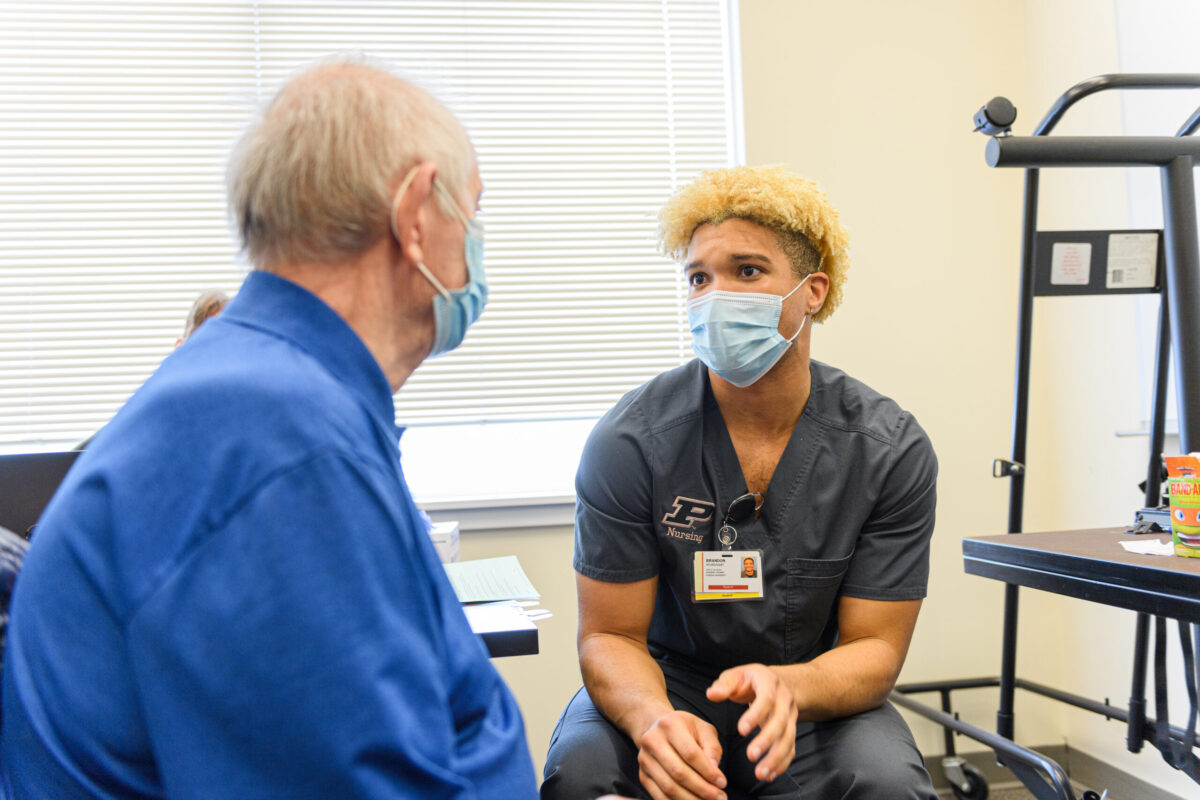Purdue Nursing to introduce new pathway to PhD in 2023

Brandon Sturdivant, then a Purdue University Nursing senior now a 2021 alumnus, discusses vital COVID-19 vaccine information with a patient at a nursing clinic in Delphi.
Written by: Tim Brouk, tbrouk@purdue.edu
The Purdue University School of Nursing will introduce a new opportunity for students to pursue their passions for research.
Starting in fall 2023, Purdue Nursing will offer a new track to students with bachelor’s degrees (BSN) to earn a PhD in four years, three if they already have a master’s degree. Times may vary depending on the student’s performance and workload. Current PhD tracks are exclusively for researchers with master’s degrees, but soon, students fresh from undergraduate commencement could join in the Purdue Nursing PhD program right away.
Libby Richards, Nursing associate professor and PhD program director, said this pathway will ensure new research pursuits in the field as well as the development of future faculty members, who will be equipped to teach the future nursing workforce. The demand for new nursing faculty and nursing scientists is high.

Nursing Associate Professor Libby Richards
“Nursing faculty are retiring at a faster rate than nurses are getting their PhDs,” Richards said. “We have a critical shortage of PhD-prepared nurses. If we don’t have PhD-prepared nurses, we don’t have enough faculty to continue to educate the nursing workforce. It’s a spiral. We have to focus on PhDs to keep our faculty workforce robust.”
Full-tuition scholarships will be available for competitive students accepted into the BSN to PhD program.
According to the American Association of Colleges of Nursing, “U.S. nursing schools turned away 80,407 qualified applicants from baccalaureate and graduate nursing programs in 2019 due to insufficient number of faculty” while in Indiana, the Indy Star reported, “275,000 nurses will need to join the workforce by 2030 in order to prevent a significant workforce shortfall.”
“With this program, we are deliberately educating research-focused doctorates with clinically focused doctorates because it’s critical that both understand what each other brings to the table,” Richards explained. “The PhDs are going to create the new knowledge, but the DNPs (practice-focused doctorates) are going to be applying the new knowledge. We need both. So, they are going to be taking classes together and working side-by-side, which I am excited about.”
These students will become “nurse scientists” with research and analyses aimed at improving patient, family and population health.
Purdue Nursing faculty lead research initiatives on a variety of health concerns. Some ongoing examples:
- Elder mistreatment
- Palliative care and end-of-life decisions
- College student well-being
- Nursing students and social justice
- Nurse stress
Richards said PhD students will have chances to collaborate with researchers from other Health and Human Sciences programs, such as the Department of Public Health, or from outside, such as the Brian Lamb School of Communication.
“Most importantly, we want students who are excited to contribute to the profession of nursing,” Richards said. “As leaders in the profession, nurse scientists are vital in practice, industry and policy settings.”
A PhD in nursing opens a host of career opportunities for graduates. Anna Forster earned her PhD from Purdue Nursing in May. Today, she is a postdoctoral fellow at the Indiana University School of Nursing at Indiana University-Purdue University Indianapolis.
“Thanks to my PhD, I have the skills and knowledge to be able to thrive as an independent researcher with a unique program of research,” Forster said. “Completing a research project or pilot study is a multifaceted challenge, but thanks to my PhD, I am able to face these challenges head on. I feel my PhD training prepared me to handle all aspects of the research process from intervention creation and statistical analysis to manuscript writing and dissemination activities. I also feel that my PhD has allowed me to thrive as a leader.”
Forster’s Purdue dissertation explored women’s affects — mood and emotions — on physical activity while in a romantic partnership. Today, her research has broadened to study affect and physical activity among older adults. Both research projects had strong starts because of her time in Purdue Nursing. “Looking back, I had countless experiences and made numerous connections that have greatly impacted my professional and personal life,” Forster said. “Without Purdue Nursing, I would not be where I am today.”
Discover more from News | College of Health and Human Sciences
Subscribe to get the latest posts sent to your email.